Partner Spotlight
5 Ways Revenue Sharing Drives Access, Innovation, and Quality Outcomes in Higher Ed
Written by Andrew Hermalyn on Apr 3, 2023
Related content: Higher Education, University, Leadership, Strategic Partnerships, Digital Education

Seeking solutions to rising student loan debt, the U.S. Department of Education (ED) recently announced a review of the 2011 Dear Colleague Letter, guidance introduced by the Obama administration that supports partnerships between universities and companies like 2U. The Letter’s “bundled-services provision” permits universities to share revenue with an unaffiliated third party as long as they provide a “bundle of services” in addition to recruitment support. These essential services can include technology, clinical placement, student support, marketing support, career counseling, and any other services needed to drive great student experiences and outcomes.
While 2U shares the Administration's goals of serving students by reducing student debt, this latest move reveals an Education Department out of touch with a modern, progressive world—as well as a fundamental misunderstanding of the critical role that industry plays in higher education in the 21st century. Increased regulation threatens to stifle innovation and reduce access to high-quality online education for students nationwide.
I’m thrilled to see that over 30 of 2U’s university partners provided comments to ED in support of keeping the bundled-services provision and revenue-sharing agreements in place. In addition to comments from many graduates from online programs supported by 2U, our university partners' comments underscore the value that revenue sharing has created for both universities and students. In fact, about 84% of public comments submitted to ED support keeping the current guidance.
Too often, these voices—the very universities who understand these partnerships best—are left out of the conversation. Revenue-sharing partnerships give universities an important tool to better serve students. Over the last 15 years, 2U and our university partners have given millions of learners the opportunity to pursue an education through online programs, from free courses to full degrees, without uprooting their lives. The bundled-services provision is integral for us to continue to achieve this impact together.
Here are five of the most important reasons why our partners and their students say it’s critical to preserve the guidance that makes these opportunities possible:
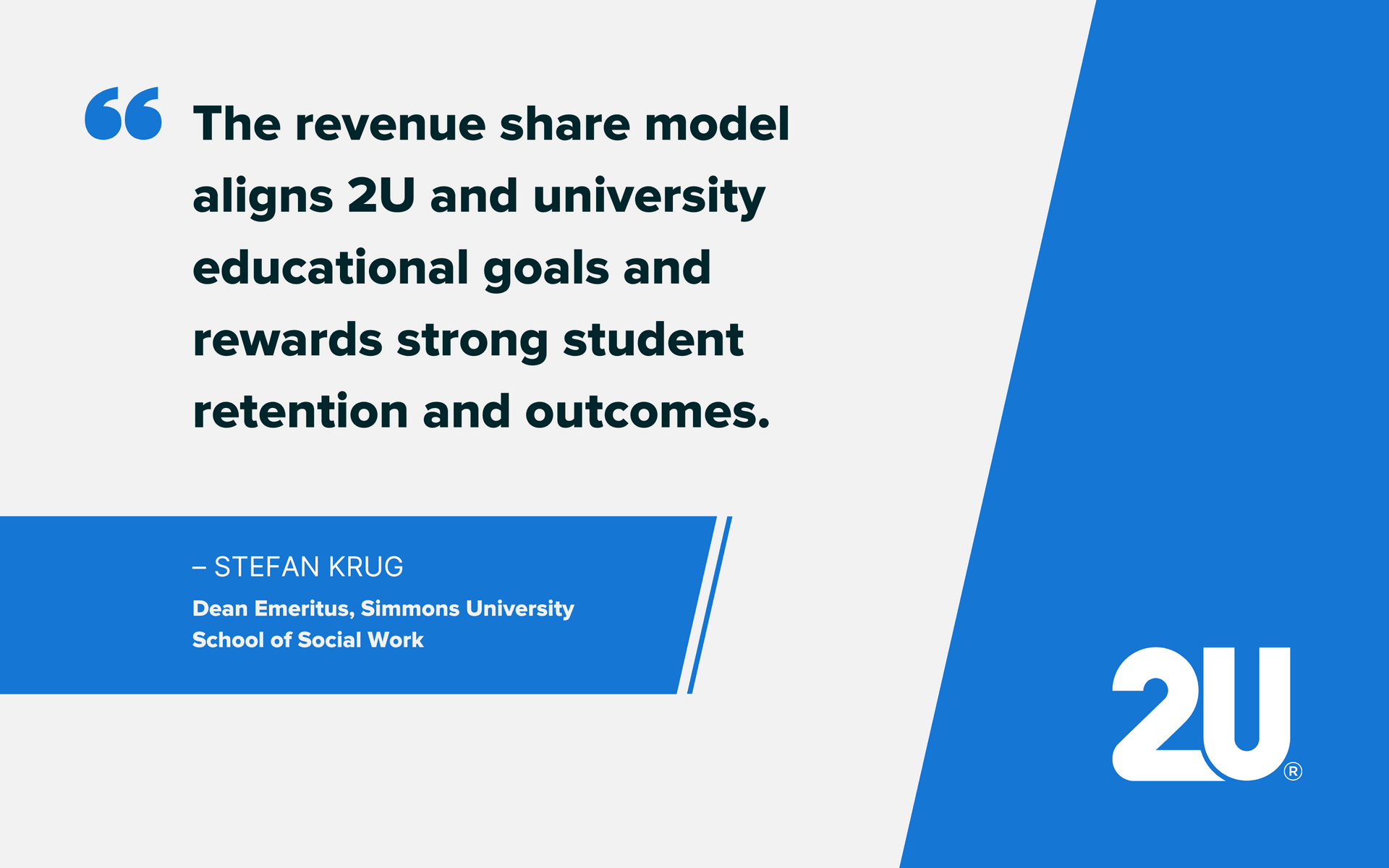
1. Revenue sharing is the only model that aligns incentives in the best interest of students.
1. Revenue sharing is the only model that aligns incentives in the best interest of students.
2U’s financial success is directly connected to helping our partners prioritize student success and deliver great outcomes. Unlike fee-for-service providers, who get paid upfront regardless of whether students graduate, 2U only gets paid as students progress through their programs, ultimately earning a degree.
Grover Gilmore, dean emeritus of the School of Applied Social Sciences at Case Western Reserve University, addressed this fact in his ED comments. “Tuition revenue sharing is a good business model for the university,” he wrote. “They [2U] share our interest in attracting qualified candidates who can complete the program. As a full-service partner, it is in the interest of every area in the business model—from marketing to online content support and student support—to ensure that students are served very well. With bundled services, marketing’s success and the revenue generated are tied directly to the enrollment and eventual graduation of students.”
Jonathan S., who earned his online Master of Public Health (MPH) degree from George Washington University (GW), emphasized 2U’s high level of support in his comments to ED. “I could take live online classes with professors and have rich discussions with classmates from anywhere I needed to be,” he explained. “2U worked with GW to assign me a student success manager—who supported and counseled me throughout my program, making sure I remained engaged, cared for, and most importantly, graduated on time.”
Gail S., another GW MPH graduate, discussed the program’s life-changing impact for herself and others. “The program was instrumental in helping me achieve my goal. In so many ways, I feel like I got a better learning experience online.”
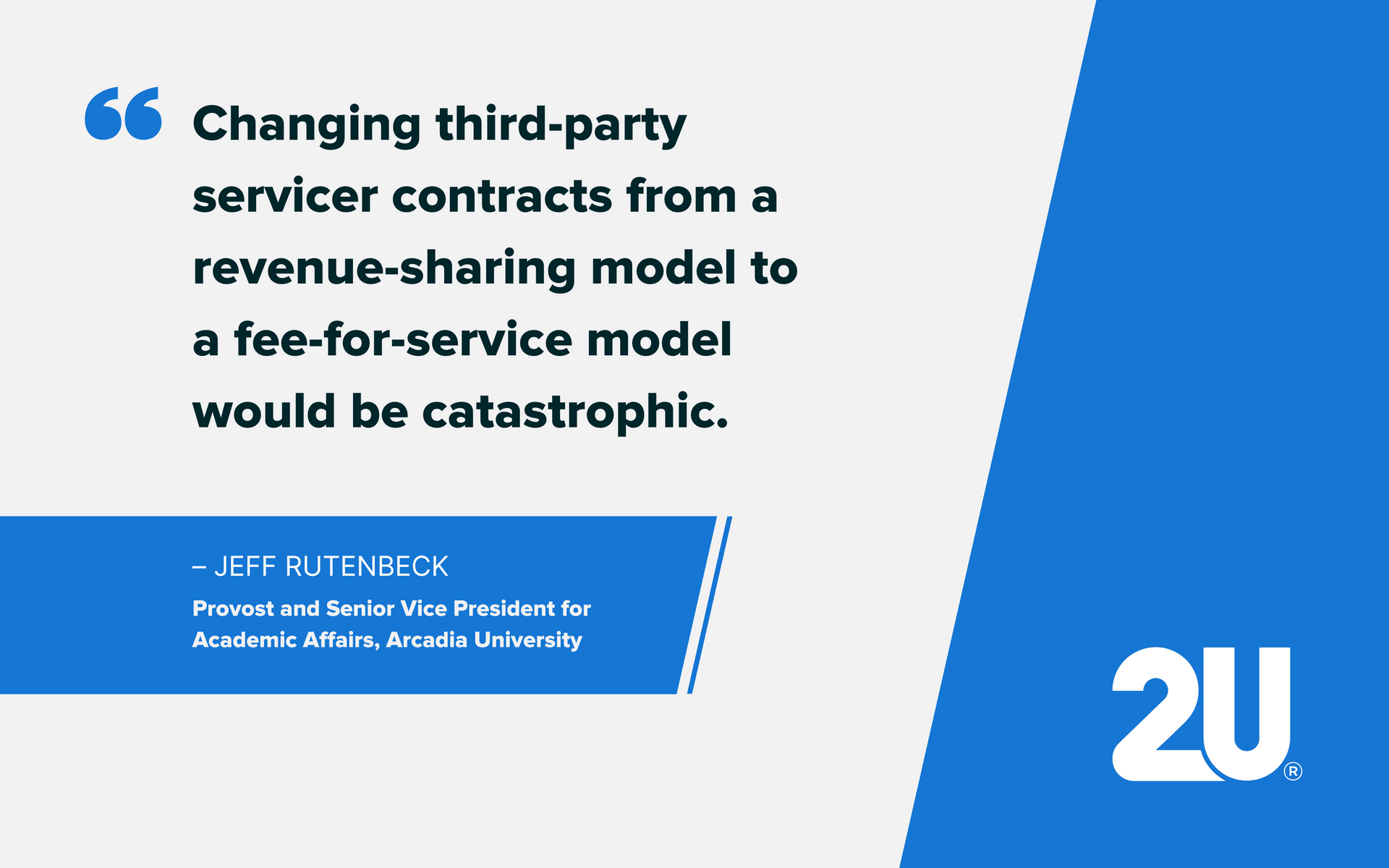
2. Revenue sharing provides universities with the capital for innovation and reduces institutional risk.
2. Revenue sharing provides universities with the capital for innovation and reduces institutional risk.
Developing a purpose-built, high-quality online program is expensive and risky. 2U invests $5 million on average into each online degree program we support before recouping a single cent. Universities bear minimal upfront investment while maintaining exclusive control over core academic functions including admissions, financial aid, curriculum, instruction, and tuition. When you consider that up to 25% of all online degrees launched by universities fail within the first year, this support is especially critical.
A revenue-sharing model eliminates that risk for institutions, enabling them to develop the innovative online education this country desperately needs, including programs that transform people into nurses, teachers, physician assistants, and therapists.
Jeff Rutenbeck, provost and senior vice president for academic affairs at Arcadia University, spoke to these higher costs in his ED comments. “We have conducted independent market research that indicates we would need to spend anywhere from 30 to 40 percent of our anticipated program revenue just on marketing and recruitment. And these investments would have to be continually adjusted using the latest techniques in data analysis and digital strategy—competitive intelligence that is extremely difficult for an institution of our size and means to build and maintain,” he said. “Changing third-party servicer contracts from a revenue-sharing model to a fee-for-service model would be catastrophic for all cash-constrained institutions like Arcadia.”
AnnaLee Saxenian, dean emerita of the UC Berkeley School of Information, added this about the benefits of 2U’s support: “Our relationship with 2U provides institutional independence, oversight, and shared accountability. It has enabled the ‘I School’ to focus on what it does best: developing curriculum, hiring and overseeing faculty, and instructing and mentoring students.”
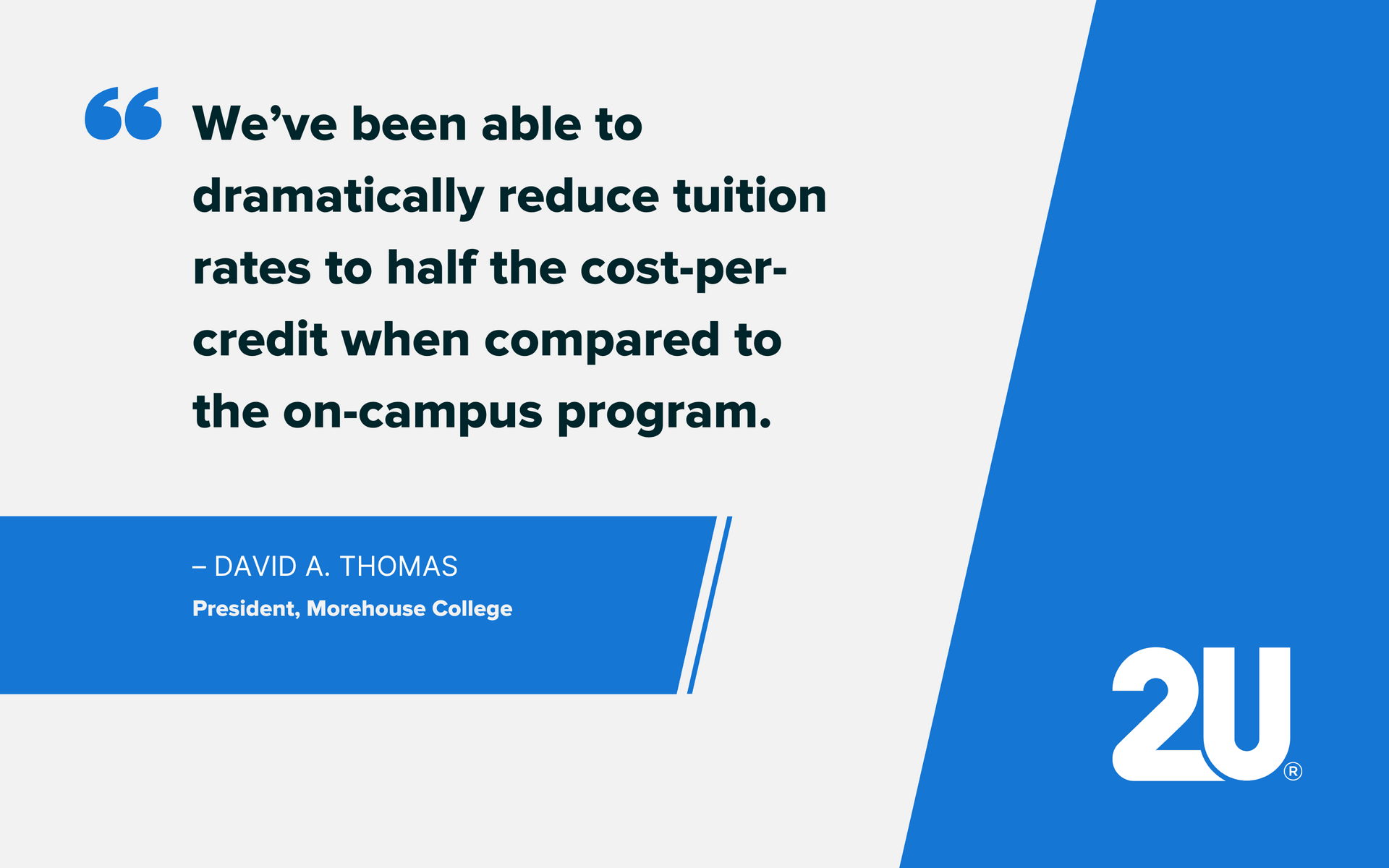
3. There’s no evidence whatsoever that revenue sharing increases tuition or student debt.
3. There’s no evidence whatsoever that revenue sharing increases tuition or student debt.
We think the exact opposite is true, in fact. Online program managers (OPMs) like 2U operate at a scale that most universities do not. And by placing significant expenses on OPMs, the revenue share model drives greater efficiency, which in turn can lower prices for students at an institution’s discretion.
As Todd Nicolet, vice provost for digital and lifelong learning at UNC Chapel Hill, said in a recent 2U partner panel, “We have the shared incentive to work together and actually create great efficiencies. If we switch to fee-for-service . . . the cost of education is going to go up. I'm really worried about that because we're all trying to make the cost of education go down so we can reach more people.”
Though 2U doesn’t set tuition, we strongly encourage our partners to lower the cost of their programs and offer disruptive pricing whenever possible because they make programs more attractive to qualified students. Many of our partners have done just that, including Boston University with its $24K master’s degree in public health. Their programs simply wouldn’t exist without bundled services and 2U.
Kent Syverud, chancellor and president of Syracuse University, explained to ED that a revenue-sharing partnership “provides the critical upfront investment in marketing, technology, resources, student support, and resources as well as the ability to launch accredited programs quickly. Thanks to the scale we’ve achieved through our partnership with 2U, we were able to substantially reduce tuition rates for both our online and on-campus Master of Social Work program—cutting the cost for MSW students very substantially.”
Another great example of 2U helping to lower tuition rates is Morehouse College. In his ED comments, David A. Thomas, president of Morehouse, discussed 2U’s role in helping to develop their online B.A. in Business Administration. “We were able to launch Morehouse Online in half a year, bringing a Morehouse education to over 550 students from across the country who would not otherwise have benefited from our school's mission,” he wrote. “Because of this scale and the benefits of the online modality, we’ve been able to dramatically reduce tuition rates to half the cost-per-credit when compared to the on-campus program. A revenue share partnership makes all of this possible.”
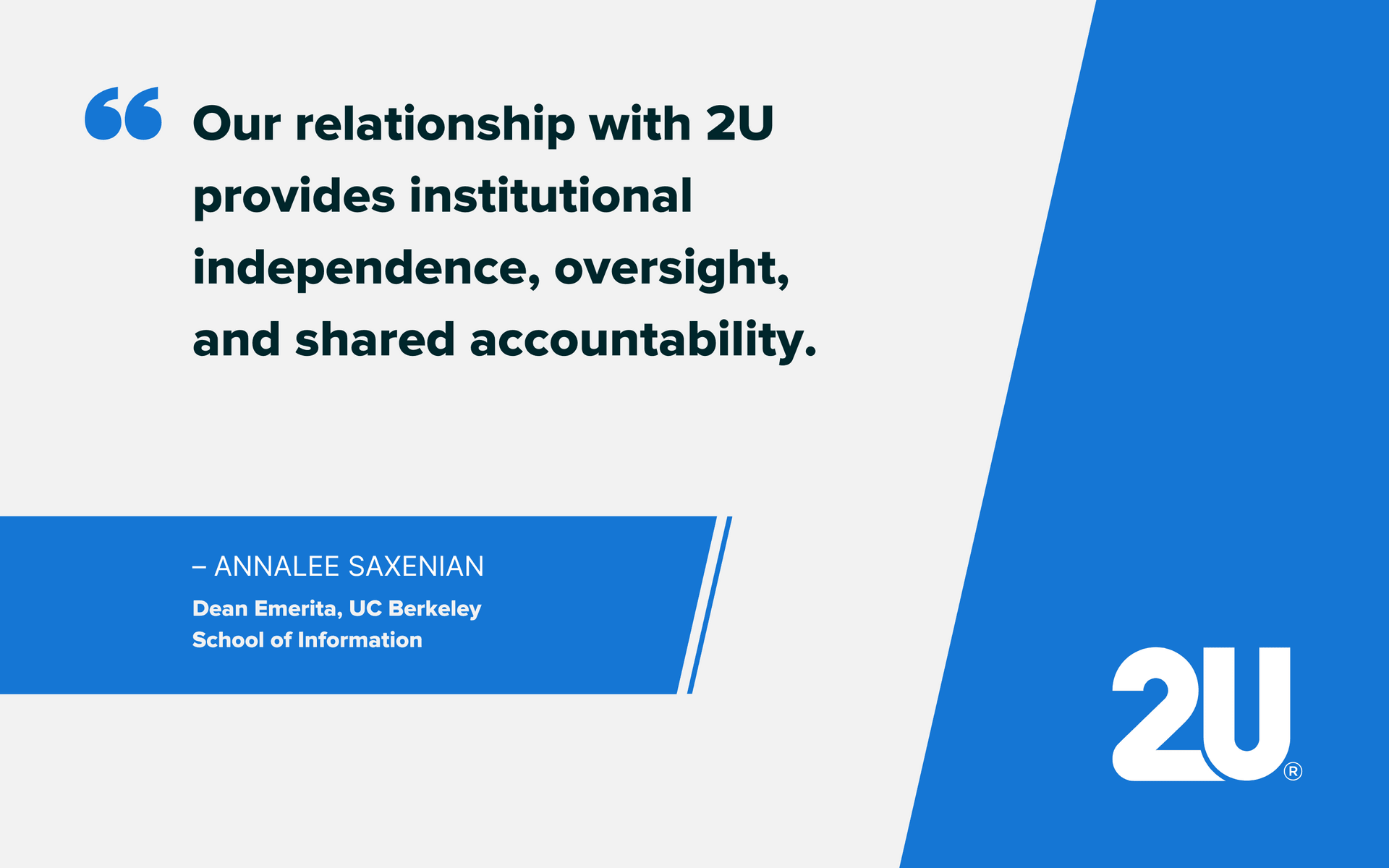
4. Revenue share arrangements do not take funds away from institutions. They create greater economic opportunity.
4. Revenue share arrangements do not take funds away from institutions. They create greater economic opportunity.
2U’s investment capital is the reason these online degree programs get off the ground, and our technology and expertise is often the reason that universities are able to successfully operate the programs in a complicated and fast-moving digital marketplace. The overall revenue simply wouldn’t exist without these arrangements.
Eric Spina, president of University of Dayton (UD), spoke to these benefits in his ED comments. “By partnering with 2U, UD was able to launch its online programming more quickly than it would have been able to do without such a partner,” he wrote. “The expansion of its missional reach through its partnership with 2U has not come at the expense of any aspect of its educational mission.”
Helen Drinan, interim president of Cabrini University, referenced similar reasons for partnering with 2U in her comments to ED: “Currently, we recruit students only in our local area because we have very limited marketing capacity,” she said. “This calls for far more expertise in technology-based recruiting than we can possibly afford alone. 2U has guided our programs well and quickly. For a tuition-dependent, modestly endowed institution, this backing is the difference between getting into expanded markets and not.”
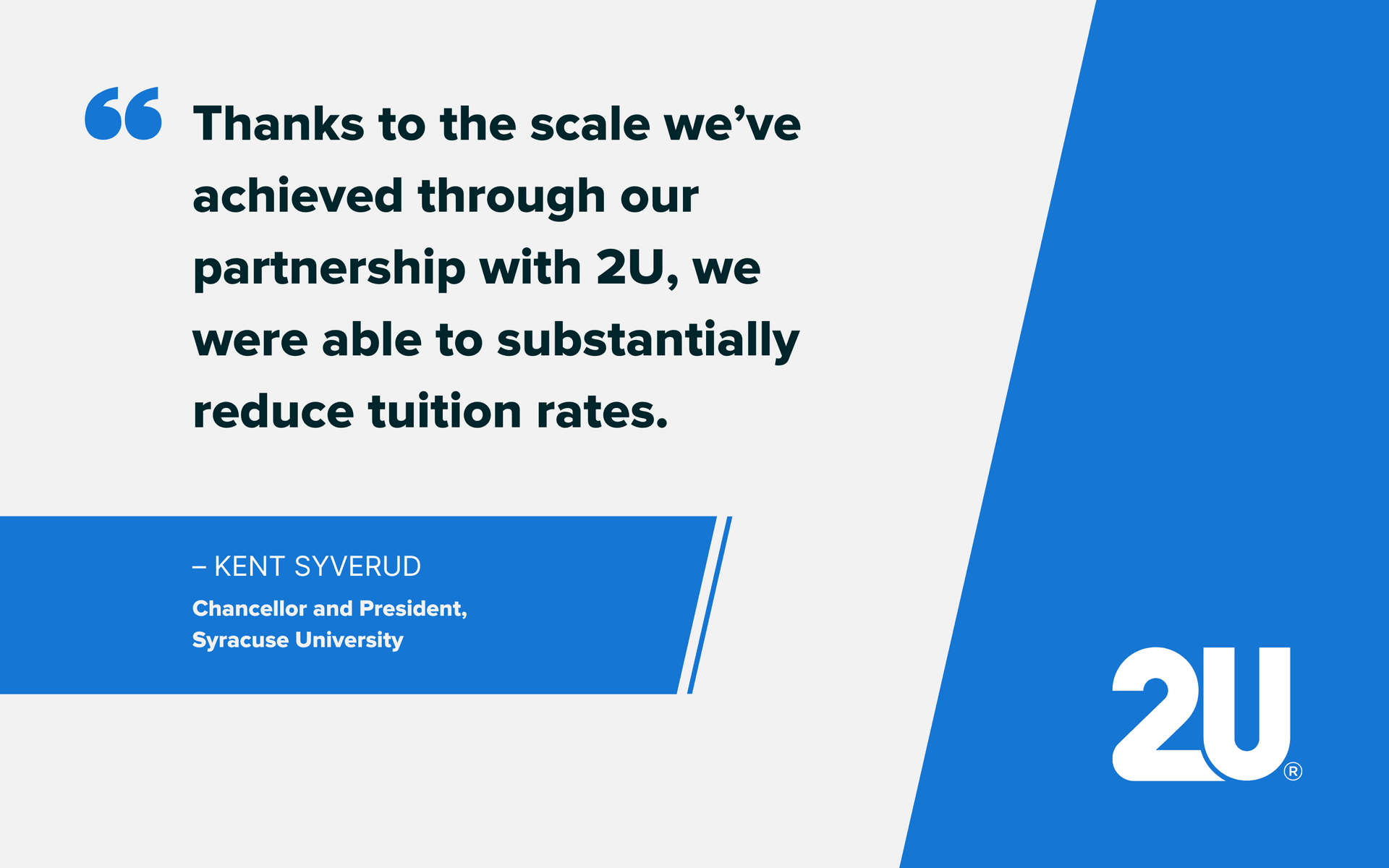
5. Most importantly, 2U’s public-private partnerships—which are expressed through a revenue share—result in tangible benefits to students.
5. Most importantly, 2U’s public-private partnerships—which are expressed through a revenue share—result in tangible benefits to students.
From public institutions like UC Davis to private universities like Georgetown, 2U has helped our university partners develop 180 state-of-the-art online degree programs in fields like nursing, education, counseling, and data science. Over 50,000 students have graduated from these degree programs, with 97% of alumni respondents reporting positive career outcomes. Today, they’re teaching in classrooms nationwide, providing pivotal healthcare to their communities, and bringing in-demand tech skills to local employers.
2U’s third annual Transparency Report dives even deeper into how we are leading the charge in meeting students’ needs. From matching thousands of students to over 8.5 million hours of virtual and in-person field placements across all 50 states in 2021 alone, to referring students to employers over 39,000 times for open job positions that same year, 2U’s support services are critical to helping schools deliver positive outcomes at scale.
2U’s partnership with Simmons University is a notable example of our passion for student success. Stefan Krug, dean emeritus of Simmons’ School of Social Work, shared that “these programs extended the mission of the university to enable individuals, primarily women, to pursue pathways to education without having to uproot their lives and livelihoods. We could not have launched these programs without the significant upfront capitalization provided by 2U. The revenue share model aligns 2U and university educational goals and rewards strong student retention and outcomes.”
Laura C., a graduate of the online Master of Library and Information Science program from Syracuse University, perfectly illustrated those outcomes in her ED comments. “Because I was able to receive this degree, I have my dream job of working as a school librarian,” she wrote. “I would never have been able to make that leap if the degree was only offered on campus. Online learning has allowed me to move into a career that I love, making a positive difference in the lives of students.”
Meanwhile, Kelli P., who earned her online MBA from UNC Chapel Hill, called her program “undoubtedly the best option for me for professional, personal, and financial reasons. While I was in the MBA program, I was promoted to a very senior role. This promotion catapulted my career and I was tapped on the shoulder two years later for an incredible opportunity at a new company. The flexibility was crucial for me, and I’m immensely grateful.”
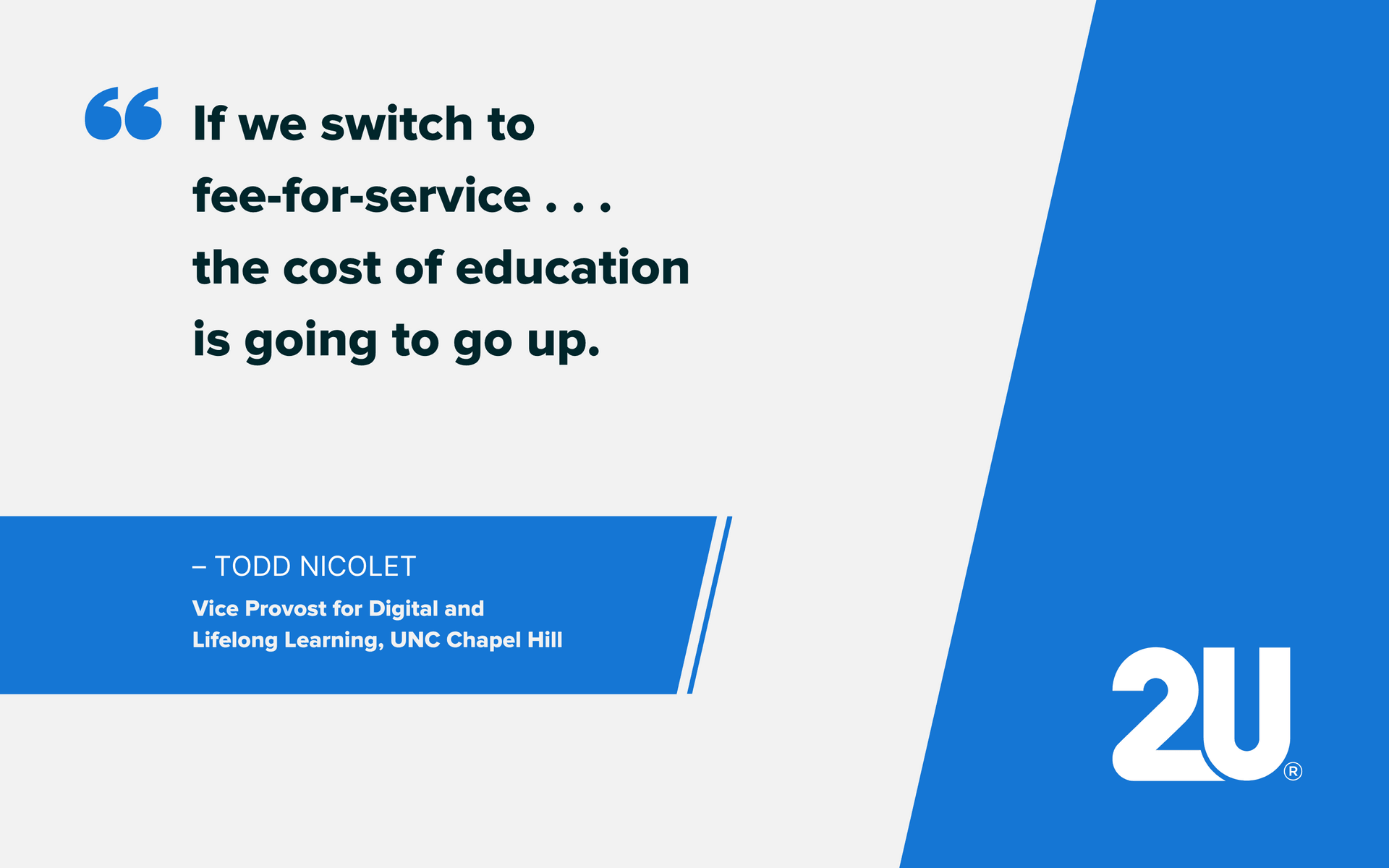
Access, Affordability, and Great Outcomes: Revenue Sharing Enables It All
Access, Affordability, and Great Outcomes: Revenue Sharing Enables It All
I think we can all agree that our country needs greater access, affordability, and outcomes for millions of Americans who are underserved by traditional education. The current guidance makes achieving these goals possible. Limiting a university’s ability to partner with companies like 2U to provide quality online learning would be enormously detrimental to the future of education.
Matthew J., who completed USC’s online Master of Teaching program while teaching in South Korea, offered ED perhaps the most powerful reason for why revenue-sharing partnerships must continue. “My program was a game changer,” he explained. “I could pursue my education while not having to quit my job. Online education is important—it can be as rigorous and engaging as in-person, and you can build a community. I hope ED will continue to support policies that help, and not hinder, colleges and universities from working with companies like 2U that are essential to expanding access to these important opportunities.”
Latest.
Learn more about us.
At 2U, we’re on a mission—to eliminate the back row in higher education and help partners thrive in the digital age. To learn more about who we are and what we do, follow the links below.